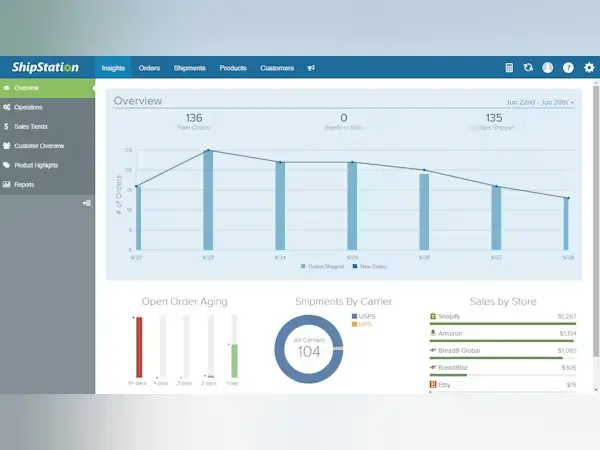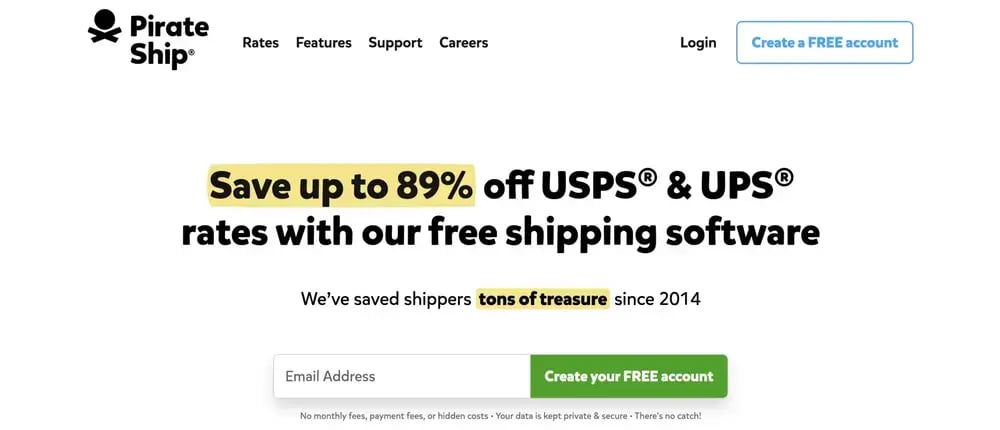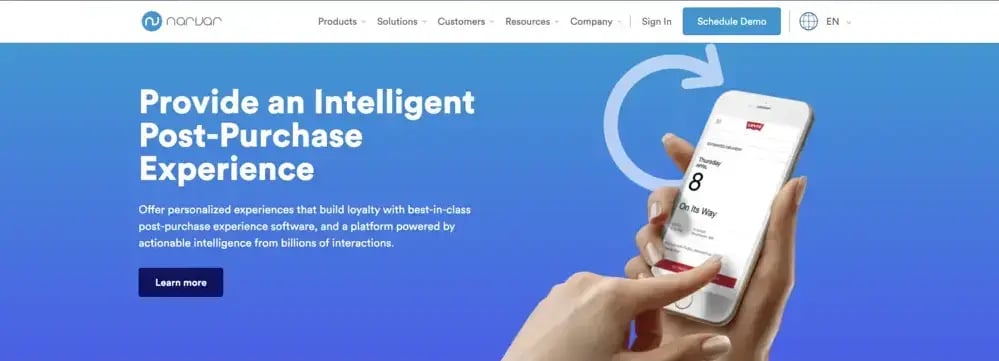Ecommerce Shipping Software Solutions Platforms in 2025

What we’ll cover
In a rush and need the TL/DR version?
Shipping software is a must-have for smoothly handling eCommerce logistics and ensuring on-time delivery for customers. This article features 15 eCommerce shipping platforms and outlines 8 key factors businesses should consider to find the best fit among them.
- ClickPost: A multi-carrier shipping management platform integrated with 500+ carriers, ideal for automated shipping, real-time tracking, managing returns, and handling shipping exceptions.
- ShipStation: A shipping software for businesses needing quick inventory management, branded tracking, and bulk label generation.
- Shippo: Offers pre-negotiated shipping rates for 40+ carriers and a rate shopping feature, making it suitable for small and medium-sized businesses.
- EasyShip: An expert in cross-border shipping, providing discounted rates for popular carriers and quick rate calculation.
- AfterShip: A post-purchase management platform excelling in personalized customer communications and optimizing returns and exchanges.
- ShipBob: A premier 3PL company offering digital tools for managing inventory, 2-day shipping, tracking parcels, and ensuring on-time deliveries.
- Ordoro: A 3-in-1 shipping platform that simultaneously addresses shipping, inventory, and dropshipping needs, excelling in order routing.
- Sendcloud: Provides advanced shipping capabilities for an enhanced checkout experience, easy delivery slot booking, and supports multilingual tracking.
- Stamps.com: Popular for affordable mailing and shipping services, especially for USPS, and for providing free shipping supplies to SMBs.
- Veeqo: A cloud-based shipping solution that offers significant shipping rate discounts and integrates with multiple warehouses for seamless inventory tracking.
- ShipHero: Offers a proprietary warehouse management system, making it ideal for managing shipping across omnichannel businesses.
- ShippingEasy: Well-known for offering volume discounts on express delivery services and tracking dropshipping orders worldwide.
- PirateShip: Caters to SMBs by unlocking exclusive shipping services from USPS and UPS, enabling quick label generation from home printers.
- Narvar: A shipping software that focuses on customer retention with personalized tracking, notification alerts, and delivery date predictions. A shipping software designed to enhance customer retention through personalized tracking, notification alerts, and delivery date predictions
- Metapack: Offers over 4,000 delivery options and a delivery management platform, ideal for automatic carrier selection.
These software companies are popular among eCommerce retailers for simplifying the shipping process, offering quick integrations with multiple carriers, and providing numerous logistics benefits.
Note: While this summary captures highlights, it might miss some finer points—reading the full article is encouraged.
Overview
When Amazon and Walmart set the standards for fast deliveries and convenient BOPIS (Buy Online, Pickup In-Store) service, shoppers became well aware of what keeps them engaged with any online brand. Nowadays, they expect you to know their shipping preferences and meet them intuitively.
Consider these facts:
- 62% of customers demand free deliveries
- 45% want to on-time alerts on their order statuses
- 52% prefer 2-day deliveries
4 Ways to Enhance eCommerce Delivery Experiences
Boost customer satisfaction with 4 proven strategies to enhance eCommerce delivery experiences.

In this article, we’ll explore the usefulness of shipping software for eCommerce businesses and list 15 of the best players in the market.
Let’s begin!
Are you equipped with the resources to handle such demands, especially when shipping rates have increased by 193% since last year— putting more constraints on your shipping options? If not, you may want to add a robust ecommerce shipping software to your tech stack.
What is an eCommerce Shipping Solution?
Shipping software helps with logistics management and optimizing your shipping workflows. The best use case of shipping software is its capacity to automate processes and perform them with precision to reduce errors and maintain order.
Here’s a short list of tasks most shipping software does:
- Compare shipping rates
- Select carriers based on specific metrics
- Generate shipping labels
- Track packages
- Send customer notifications
Ultimately, with shipping software, you can cater to the diverse fulfillment and delivery needs of your customers. Let’s take a look at some of these customer expectations and how shipping software can help you fulfill them.
- They want affordable shipping. Done! Use pre-negotiated shipping rates from shipping software.
- They want all the orders in the same box. Easy. Consolidate them into a single shipment using shipping software.
- They want to know when orders will arrive at checkout. Simple. Add estimated delivery dates from shipping software to the checkout page.
Whether you follow the B2C or D2C or any other route, you'll find that eCommerce shipping software has ways to invigorate your growth, enhance your customers’ satisfaction, and reduce operational costs.
7 Benefits of Using eCommerce Shipping Solution platform
The possibilities with shipping software are endless. An eCommerce shipping software gives you many benefits as you’ll soon find out.

1. Streamlined shipping process
Shipping software helps streamline your day-to-day operations from the moment an order is placed with you till the time it gets delivered to your customers. For instance, you can use its APIs to streamline tracking and manifest orders with carriers. You can display multiple shipping methods to customers at checkout and integrate with ERPs (Enterprise Resource Planning), eCommerce sales channels, WMS (Warehouse Management Systems), etc.
2. Multi-carrier integration
A Retail Week study shows that 70% of customers want flexible delivery options, from 1 hour to the next day or even time-defined. The golden standard in eCommerce is to tailor shipping to every customer’s preference. With multi-carrier shipping software, you can connect with major carriers like FedEx, UPS, DHL, and USPS, as well as hundreds of specialized carriers for hyperlocal, flat-rate, and international shipping needs.
3. Reduced shipping costs
With shipping software, you won’t have to puzzle over ways to reduce costs, because it negotiates rates for you and offers volume discounts. It has the right tools in place to help you identify cost centers and remove barriers to profitability—such as rate comparison, optimal route selection for deliveries, and adding insurance for theft, loss, and damage.
Related read: Strategies to Reduce Shipping Costs for E-commerce Businesses
4. Improved order accuracy
An eCommerce shipping solution proactively reduces the return rate of your orders caused by shipping the wrong products. It checks for weight discrepancies against order specifications, audits orders with barcode scanning, and monitors inventory flow. When you integrate a shipping solution with your WMS, you can ensure that the right SKU is picked, packed, labeled, and shipped to customers.
5. Enhanced customer experience
Shipping software creates a positive shopping experience for 90% of customers who seek ways to track their orders and 51% who demand real-time tracking. It provides a way for you to keep them up-to-date with instant notifications, estimate arrival times to help them make informed purchasing decisions, and give them a range of delivery services to select the one that’s most convenient for them. This inculcates customer trust and long-term relationships with your brand.
6. Better order management
Order management is one of the many specialties of eCommerce shipping software. From automating the order manifestation process to accounting for billing cycles, it handles every sequence, including order processing and delivery. It allocates shipments to carriers after carefully selecting them based on shipments, customer locations, and your pre-given business goals increasing order delivery success rate. By monitoring order flow and alerting customers during shipping delays, it ascertains that RTOs (Return to Origin) are reduced.
7. Data and analytics
Shipping platform analyzes vast amounts of shipping data to provide insights into your business performance. Having an acute understanding of what works and what doesn’t can help you optimize logistical efficiency by adjusting your fulfillment strategy, ensuring carriers meet their SLAs, and reducing costs. Additionally, you can gain valuable customer feedback through metrics like Net Promoter Score (NPS).
Best 15 eCommerce Shipping Solution Software in 2025
Now that we’ve stated why you should use eCommerce shipping solutions, let’s narrow down the best of the 600+ options available in the market to an easy 15.
| Company Name | Key Features | Ratings |
| ClickPost | Real-time tracking, Multi-carrier integration, Shipping analytics | 4.5/5 |
| ShipStation | Multi-channel shipping, Discounted shipping rates, Advanced automation | 4.0/5 |
| Shippo | Carrier comparison, Label printing, Address validation | 4.3/5 |
| Easyship | Automated shipping rules, Multi-carrier rate comparison, Tax/duty calc | 4.3/5 |
| AfterShip | Shipment tracking, Returns management, Branded tracking pages | 4.6/5 |
| ShipBob | Fulfillment services, Distributed warehousing, Order management | 4.1/5 |
| Ordoro | Inventory management, Dropshipping support, Barcode scanning | 4.7/5 |
| Sendcloud | Multiple carriers, Automated shipping, Branded tracking | 4.3/5 |
| Stamps.com | Discounted USPS rates, Integrations with eBay, Amazon, etc. | 4.4/5 |
| Veeqo | Multi-channel inventory, Shipping management, Returns management | 4.2/5 |
1. ClickPost
If you have a business need for all-round shipping management then ClickPost will appeal to you the most. Be it printing labels in bulk, offering dynamic EDDs to customers, or tracking orders in real-time, ClickPost leverages technology to automate each process, lower TAT, and improve your operational efficiency.
Key Features of Clickpost
- Smart carrier allocation system that automatically selects the right carrier based on your custom needs and business goals.
- A rich suite of APIs for order management, pickup scheduling, real-time shipment tracking with webhook, proof-of-delivery collection, etc.
- Multi-channel customer notifications with uniform milestone-specific alerts plus WhatsApp opt-in for personalized interactions.
- Branded and white-labeled tracking portal that is embedded with marketing tiles to power your cross-selling initiatives.
- Complete returns automation solution, including return portal, flexible exchange module, and refund generation.
Streamline your shipping experience with ClickPost

2. ShipStation
ShipStation is a powerful shipping software for merchants who have problems with managing orders across different sales channels. It puts the lever in your hand with tools for tracking inventory, managing drop shipping, consolidating shipments, and syncing orders from multiple channels. As it did for Wondercide, managing its tricky fulfillment procedure with order tags and shipping rules.
Related read: Looking for ShipStation Competitors and Alternatives?

Key Features
- Negotiated shipping rates for UPS, USPS, and DHL.
- Customizable emails and templates for packing slips and shipping labels.
- Automated rules for multi-package shipping and scan-based workflows to streamline fulfillment.
- Bulk label generation at one go.
What do you dislike about ShipStation?
What problems is ShipStation solving and how is that benefiting you?
3. Shippo

Small and medium businesses that have anxiety over creating shipping labels for multiple storefronts and marketplaces will appreciate Shippo dexterity in automating label generation. It's pre-integrated with 40+ carriers and gives you a way to not only quickly print these labels but save up to 90% with exclusive deals on carrier rates. Its recourse to competitive shipping rates have reduced costs for brands like Vontelle.
Related read: Top 14 Best Shippo Alternatives & Competitors [2025]
Key Features
- Gives access to real-time carrier rates and helps with rate shopping.
- Offers insurance coverage.
- Integrates with top eCommerce channels at no additional costs.
- Tracks order seamlessly and send branded tracking notifications.
I liked that it gave customers 24/7 tracking and estimated dates because it saves customers from reaching out and asking for a delivery date.Review collected by and hosted on G2.com.
The pricing is annoying and I think the actual shipping isn’t the greatest because of how confusing it can be for large batches.Review collected by and hosted on G2.com.
Finding a good shipping software that’s user friendly — however we did not use this software for long.
The only benefit was the customer tracking.
4. Easyship

What induces more anxiety in an eCommerce retailer than poorly executed international shipping? Easyship comes as an expert solution in expanding shipping across borders. It offers a risk-free commitment to help supercharge your shipping with instant discounts from 550+ carriers like Aramex, Singapore Post, Royal Mail, etc. It specializes in fulfillment automation rescuing Valuchi Watches from delivery inconveniences.
Related Read: Top 10 EasyShip Competitors and Alternatives
The customer support is absolutely outstanding. Quick to respond and always on the ball. They truly do whatever it takes to get it done in a very timely manner. For the more difficult issues, always follow up and eventually get it corrected which has greatly benifit our business. Making us more productive and preciese.
The integration of EasyShip into our website has been so helpful although often incorrect, it is being worked on to my understanding.
Easyship is very easy to navigate, as we use it several times a day.
The implementation and cost of easyship has been worth every penny especially once we get the wrinkles ironed out.Review collected by and hosted on G2.com.
There are only a few things that lack on the back end that are currently being fixed as we have seen. Such as weights and zip codes not loading properly into easy ship and causing an error. the weights are being adjusted and working correctly now for our amazon. Need to work on our website though.
The Zip code errors that prevent a dash in the line does create some headache, that we hope to see corrected if an entire US zip code is put in or an international zip code that has a dash in it will not let us edit & save the shipment.
The weights not loading in correctly make our customers pay more than they should and box size and weights be inccorect often, which we have to manually correct.
With all of that said the service is great and hope some things on the back in are corrected to further help and grow your company.Review collected by and hosted on G2.com.
Currently trying correct the weights, box sizes and zip codes integration to save time incorrect labels
Key Features
- Free shipping rate plugin for checkout to arrest cart abandonment.
- Built-in calculator for taxes and duty fees.
- Branded tracking and returns portal.
- Pre-defined shipping rules for faster fulfillment.
5. AfterShip

Aftership has earned the badge of one of the most popular shipping software solutions for post-purchase. If you are worried that customers won’t engage with you after a sale, you may want to explore AfterShip to reignite their interest with its personalized emails, SMS, forms, and popups. Another use case of AfterShip is optimizing returns using tools like automatically enforcing return rules that can arrest return rates.
Related Read: Top 14 Aftership Competitors and Alternatives
Key Features
- Order management portal for syncing orders from multiple channels.
- Automated shipping system that selects the right shipping option based on shipment dimensions.
- A centralized dashboard that displays shipping rates and transit times.
- A returns portal and warranty portal that runs on your pre-given business objectives and preferences.
Aftership helps our team keep organized with all of our logistical needs. It helps automate the process of updating clients on shipments and keeping our team up to date on each orders progress. Ankush has been extremely helpful whenver we've run into any issues and we'd highly recommend this app for anyone business with logical needs.Review collected by and hosted on G2.com.
We have had no considerable downsides other than a few issues with our account auto syncing into Shopify.Review collected by and hosted on G2.com.
Aftership helps us keep organized with all of our logistical needs. This benefits our clients by keeping them up to date on shipping progress and to be able to answer question on their shipments arrival.
6. ShipBob

Classified as a premier warehousing and shipping solution, ShipBob has a record for 2-day shipping, omnichannel fulfillment, and operational expertise in global shipping. It’s a solution to problems like offering same-day delivery without incurring high fulfillment costs.
It operates in three modes: order fulfillment (warehousing, packing, shipping), inventory management (time-real inventory tracking), and omnichannel eCommerce (blending online and offline retail for Shopify, and Amazon merchants).
Related read: Looking for ShipBob Competitors and Alternatives?
Key Features
- In-house WMS software for inventory control as well as custom picking and packing needs.
- Optimal inventory distribution across warehouses in different geographies based on intelligent algorithms.
- 2-day shipping management with 100% coverage in the US and support for on-time deliveries.
- Freight management tool for strategic shipping, demand forecasting, and controlling freight costs.
The inventory section wherein they store all the Stock and how we can view all those data is quite good.
What do you dislike about ShipBob?
The claim submission is really painful, we had to submit all the documents, flexport was much better for claim submission.
What problems is ShipBob solving and how is that benefiting you?
Keeping all the things at one place for tracking ID, Shipping details, the history of order, and dispatch, All these features could be managed by single user.
7. Ordoro

Ordoro is designed to unravel complex shipping, inventory, and dropshipping problems. As a 3-in-1 shipping software, it addresses issues like manually printing labels or sending the wrong order details to customers. It offers to refine shipping workflows by running processes on auto-pilot, tracking inventory with precision, and routing orders for drop shippers with intelligent algorithms. For instance, it elevated Rafi Nova’s fulfillment by eradicating untenable call wait times.
Related read: Looking for Ordoro Competitors and Alternatives?
Key Features
- Optimizes shipping with barcode scanning, verifies orders, and supports advanced picking, and packing workflows.
- Solves chaos in shipping workflows by syncing all carriers and order data into one dashboard.
- Prevents loss of sales by keeping inventory full with automated low stock alerts and triggering auto-replenishment.
- Improves dropshipping accuracy by routing orders to Amazon FBA, order splitting, and tracking.
8. Sendcloud
Sendcloud is a shipping software that’s easy to use and has advanced shipping features. It is an expert in shipping in Europe having integrations with 100+ carriers that unlocks diverse delivery options. It supports businesses of all sizes to optimize their checkout, remove order fulfillment errors, and ship smarter with automation. As evidence, consider how Sendcloud has helped Boots expand its business to the Netherlands by personalizing shipping for its customers.
Related read: Top 10 Sendcloud Alternatives and Competitors in 2025
Key Features
- Dynamic checkout API that allows customers to choose delivery slots and times.
- A range of delivery options—slot-based, same-day, and standard deliveries, and a service point map for drop-offs and pickups.
- Real-time tracking with a widget and a multilingual tracking portal.
- Autopilot return portal that configures any return policy, generates return labels, and provides pre-negotiated return rates.
9. Stamps.com

Stamps.com is a leading service in postage printing and shipping services, especially for US-based carriers like UPS and USPS. It’s officially approved by the United States Postal Service and is known for offering affordable mailing and shipping options. Stamps.com saves users up to 88% on USPS postage. One of the best perks of this shipping software, especially for small businesses like KatsKloset is free shipping supplies and a 5lb digital scale.
Related read: Top 10 Best Stamps.com Alternatives & Competitors [2025]
Key Features
- Easy prints stamps and shipping labels in bulk for mail and packages.
- Send tracking notifications to customers as emails.
- Auto-verifies mailing addresses.
- A simple interface for selecting shipping modes based on price, shipment weight, and delivery dates.
10. Veeqo

Veeqo is a web-based shipping software that has a unique proposition—it gives back 5% of your shipping cost as Veeqo credits. Though it's only available for UPS, USPS, FedEx, and DHL carriers, Veeqo still helps you maintain profits, especially if you are an Amazon seller by keeping track of refunds, claims, and reimbursements. Its product suite has many tools that optimize inventory, shipping, and warehouse processes benefitting B2B companies like Canadian Spa Co. in seamlessly managing their inventory and shipping.
Key Features
- Provides one of the industry’s lowest shipping rates for major carriers.
- Manages order synchronization across marketplaces and smartly routes orders from fulfillment centers nearest to customers.
- Connects with multiple warehouses, monitors inventory movements, and sends reminders when stock levels are low.
- Integrates with multiple warehouses, eCommerce storefronts, marketplaces, and accounting software.
11. ShipHero

ShipHero is a full-fledged warehouse management system (WMS) that lends its resources to upgrade shipping and unlock faster delivery services. It’s committed to increasing picking efficiency and reducing costs by 35%. ShipHero instantly integrates with major eCommerce enablers like Shopify and Loop to import orders, track shipments, and boost delivery with smart technologies. It has supported Canadian Tire by optimizing its in-store fulfillment.
Key Features
- Streamlines order allocation, reorders, and inventory replenishments.
- 40+ carrier integrations with real-time rate shopping support.
- Plans for incoming returns, sets return rules, and re-stocks merchandise based on its condition.
- Boosts picking and packing processes with guided pick routes and automated batch creation.
12. ShippingEasy

Living to its name, ShippingEasy offers a one-stop shipping software for simplified shipping workflows. It offers discounted shipping, helps launch email campaigns, and runs special services for Shopify customers— such as triggering emails to recover abandoned carts, and exclusive Flat Rate green shipping. ShippingEasy makes it a little easier to retain customers, as it has done for AshaPops by lowering its shipment preparation time.
Related read: Top 10 Best ShippingEasy Alternatives & Competitors [2025]
Key Features
- Manages orders—reordering, sorting, combining, splitting, etc.
- Provides volume discounts on 2-day shipping, Priority Mail, and Express shipping for UPS and Global Post.
- Automatically maps carriers based on customer preferences and shipment dimensions.
- Auto-tracks drop shipped orders and notify customers in real-time of their order journey.
13. Pirate Ship

Pirate Ship is the best known shipping software for USPS and UPS carriers. It saves up to 89% on shipping costs on both carriers plus access to secret shipping services like Priority Mail Cubic. Additionally, it swiftly integrates with all eCommerce sales channels like Shopify, BigCommerce, eBay, and Squarespace.
It’s most helpful for businesses that prefer to have no minimum volumes, no monthly fees, and the lowest shipping rates that UPS and USPS have to offer. This particularly applies to independent small businesses like Bluminary to maintain their profits.
Related read: Top 10 Pirate Ship Competitors and Alternatives [2025]
Key Features
- Enables batch shipping.
- Quickly generates shipping labels.
- Auto-fills customer addresses.
- Send customizable tracking emails.
14. Narvar

Few shipping software solutions live up to the reputation Narvar has garnered for post-purchase optimization and customer retention. As a shipping solution, it focuses primarily on setting clear delivery timelines and crafting a highly engaging tracking experience for customers. It helps brands like Seager build customer trust with an excellent returns concierge service of 200k+ drop-off locations and order tracking system.
Related read: 10 Best Narvar Competitors and Alternatives in 2025
Key Features
- Proactive customer notification with 40+ templates for shipment, order, account, and return updates.
- Live shipment tracking on a custom-built portal that is hyper-personalized for every brand and its customer segments.
- Intelligent delivery dates powered by multiple ML models with 95% accuracy.
- Automated returns portal, order routing, and fraud detection.
15. Metapack

The highlight of Metapack as a shipping solution is its provision of 4000+ delivery services and a robust delivery management system. It has demonstrated abilities in lightning-fast label creation and helping online businesses leverage their stores for local fulfillment. It's known to swap customer anxiety for satisfaction with convenient delivery choices, on-time tracking, and green shipping amenities. For example, MetaPack assisted John lewis to successfully operate an omnichannel framework and expand its delivery services.
Related read: Top 15 MetaPack Alternatives and Competitors in 2025
Key Features
- Automatic carrier selection for every parcel.
- Complete checkout personalization.
- Complete flow of customer notifications, from pre-shipping events to returns.
- Self-service returns that implement return policy and nudge customers towards exchange.
Top 8 Factors to Consider When Choosing eCommerce Shipping Software
We have given you 15 choices for shipping software, but you would still have to decide on one.

But, if you’re in a pickle because of too many options, check out this quick list to segregate the one you must pick.
1. Integration with eCommerce Platforms
There is a reason why integrations with eCommerce platforms are a must-have in shipping software—to avoid errors with order creation and dispatch. You may operate in multiple eCommerce platforms, but having shipping software that seamlessly onboards with your sales channel will make order import fast and accurate, seamlessly generate shipping labels, display EDDs, and tracking data.
2. Carrier Support and Discounts
The sureproof way to control your shipping costs and diversify delivery methods is to onboard multiple carriers and access discounted shipping. Your customers may like the Priority one-day shipping service offered by FedEx but you may want to consider DHL for international shipping. Having the flexibility to choose the right shipping method for every customer would require your shipping software to have multi-carrier integrations as ClickPost does.
3. Shipping Automation Features
Automated shipping prepares you for on-time deliveries—with swift order manifestation, smart carrier allocation, pickup scheduling, and live tracking. The use of predictive analytics and machine learning further optimizes inventory forecasts, and order routing, dynamically adjusts estimated delivery dates, and much more. Ensure that your shipping carrier has robust automation features to give you the support you need to scale your business.
4. International Shipping Support
International deliveries require more than just connecting with the right carriers when costs, duties, and customs decide the fate of your shipments. Your shipping software must provide assistance with customs paperwork, calculations of shipping rates and duties, customs paperwork, and robust real-time tracking like Easyship and Shippo.
5. Cost and Pricing Structure
Free trials are helpful in deciding if the shipping software will give you the return on investment you want. But this should not be the sole deciding factor. Many things are factored into pricing, and sometimes you may fall into the trap of hidden charges and monthly add-on fees. It's best to opt for software that offers transparent pricing and aligns with the value it provides.
6. Ease of Use and Setup
A user-friendly interface plus quick onboarding with constant support are the demarcating points that distinguish good software from excellent one. Ease of use improves your productivity, lowers learning curve constraints, offers easy adaptability, and simplifies navigation. The shipping software should not require advanced technical skills for essential tasks like tracking, API integration, or label creation.
7. Returns Management
When 30% of orders have the possibility of being returned, it’s absolutely important to select shipping software based on certain must-have features. Look for shipping software with self-serve branded return portals that positively elevate customer experience by enforcing your return policy automatically.
Ensure the software provides a seamless way to exchange products, allowing for convenient pickups or drop-offs. Ideally, it should trigger refunds when merchandise reaches specific milestones and have systems in place for handling exceptions. Keeping these features in mind, we recommend solutions like ClickPost for their robust capabilities in managing returns effectively.
Related Read: Top 13 Returns Management Software for eCommerce
8. Serviceability
To succeed in today’s market, it’s essential to reach customers no matter where they are located. This is especially important for global operations, where specialized services such as calculating duties and managing customs documentation become critical. Select shipping software that offers worldwide serviceability and has partnerships with local carriers in addition to well-known options like UPS and DHL.
Final Conclusion
As 97% of companies reconfigure supply chains for agility, shipping software is now an eCommerce necessity. With each software having its specialties—such as ClickPost that excels in multi-carrier integration, automated shipping, and returns management, we hope you find one that offers faster deliveries, and provides personalized shipping options (69% of consumers are willing to pay extra for these), and offering an optimal return experience to your customers.
FAQ's
1. What are the common features of shipping software?
Every shipping software generates shipping labels, tracks packages, notifies customers of their shipment status, and supports integrations with multiple carriers. Some have advanced automated features like carrier selection and dynamic EDD prediction.
2. How does eCommerce shipping software integrate with my online store?
An eCommerce shipping software generally mostly uses APIs to integrate with online stores. Some eCommerce platforms like WooCommerce and Magento have plug-ins and extensions that simplify the integration process with specific shipping software.
3. Can I use multiple carriers with eCommerce shipping software?
4. Does eCommerce shipping software help reduce shipping costs?
Yes. eCommerce shipping software offers pre-shipping rates, volume discounts, and flat-rate services, to help reduce shipping costs. It compares multiple carrier rates to help you pick the right carrier based on affordable pricing.
5. What kind of automation features does eCommerce shipping software offer?
eCommerce shipping software leverages automation to select carriers based on your preset rules, track shipments in real time, generate shipping labels, trigger notification alerts, process return requests and initiate refunds.
6. Can eCommerce shipping software handle returns?
Yes, eCommerce shipping software can efficiently handle returns with a self-serve returns portal, return order tracking, order routing, drop-off point selection, automating return label generation, and refunds.
